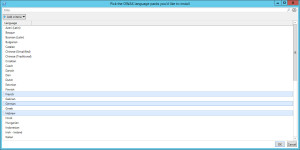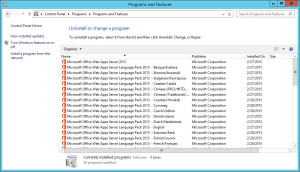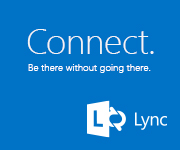 Description
Description
As a PowerShell developer, you always want your users to have the latest version of a script. It makes support a lot easier, while also making sure that users have the latest features and bug fixes. But how to encourage that? Well, for me, users of my scripts are typically not within the same environment as me. So Group Policy Objects, logon scripts, etc, aren’t a solution. Having the script automatically check for an update is much easier, and doesn’t require anything from the user1. So let’s take a look at a quick and easy method.
First, we need a repository where the update information will be held. XML is perfect for this. In this example, I created the following file, and saved it as version.xml:
<?xml version="1.0"?>
<catalog>
<article id="1697">
<title>Set-CsFeatures.ps1</title>
<author>Pat Richard</author>
<version>3.9.57</version>
<publish_date>2016-10-08</publish_date>
<description>Installs all required Windows 2012/Windows 2012 R2 components & optional tools.</description>
</article>
</catalog>
This file can reside anywhere. A file path, a web site, wherever. I chose a website for the reasons I mentioned above. You can see the above file in action at https://www.ucunleashed.com/downloads/version.xml. Some key points to the file. Each article I publish going forward will have it’s own “article” node. The ID I chose to tie to it is also the ID of the article’s URL, for consistency sake. In this example, 1697 is the prereq script seen at https://www.ucunleashed.com/1697. The version value is the version of the latest general availability (“GA”) build. We’ll query that value, compare it against the version of the script running the query, and see if it’s newer. Note that there is some other info in the XML file, and that’s irrelevant to what we’re discussing here.
[xml] $xml = (New-Object System.Net.WebClient).DownloadString("https://www.ucunleashed.com/downloads/version.xml")
$Ga = ($xml.catalog.article | Where-Object {$_.id -eq $article}).version
We supply the $article value when making the call. After that, it’s a simple comparison. In the prereq script, near the beginning, I assign a variable, $version, with a value. Let’s say it’s “3.9.55”. We compare $Ga against $Version
$Ga -gt $Version
If it’s true, we know a newer version exists. If it’s false, we know the currently running script is the latest version. In theory, we could also use this to alert of a regression in case we needed to downgrade (gasp!). So let’s put this together. We assign a variable, $xml, to the results of downloading an xml file. Then, we assign $ga to the value of “version” for the specific node within the xml file that contains the info for the article. Lastly, we do our comparison and give some output if there is an update.
[xml] $xml = (New-Object System.Net.WebClient).DownloadString("https://www.ucunleashed.com/downloads/version.xml")
$Ga = ($xml.catalog.article | Where-Object {$_.id -eq $article}).version
if ($Ga -gt $Version){Write-Output "A new version is available!"}
Now, obviously, we can pretty this up a bit. But before we do that, let’s think of issues we could run into. The big one is making sure we have an Internet connection to use to check the XML file. As much as we can often assume there will be one, a LOT of organizations block Internet access to servers as part of their security posture. So we shouldn’t assume. We can check using the following:
[bool] $HasInternetAccess = ([Activator]::CreateInstance([Type]::GetTypeFromCLSID([Guid]'{DCB00C01-570F-4A9B-8D69-199FDBA5723B}')).IsConnectedToInternet)
And then using an IF loop against $HasInternetAccess. So let’s throw this all into a function we can incorporate into our scripts and modules:
function Get-UpdateInfo {
[CmdletBinding(SupportsShouldProcess, SupportsPaging)]
param (
# Article/script to check for updates
[parameter(ValueFromPipeline, ValueFromPipelineByPropertyName)]
[string] $article
)
[bool] $HasInternetAccess = ([Activator]::CreateInstance([Type]::GetTypeFromCLSID([Guid]'{DCB00C01-570F-4A9B-8D69-199FDBA5723B}')).IsConnectedToInternet)
if ($HasInternetAccess){
[xml] $xml = (New-Object System.Net.WebClient).DownloadString("https://www.ucunleashed.com/downloads/version.xml")
$Ga = ($xml.catalog.article | Where-Object {$_.id -eq $article}).Version
if ($Ga -gt $version){
Write-Log -Level Warn -Message "Outdated version. Version $Ga is latest version. Prompting user" -NoConsole
$wshell = New-Object -ComObject Wscript.Shell -ErrorAction Stop
$updatePrompt = $wshell.Popup("A new version ($ga) of the script is available. Would you like to download it?",0,"A new version is available",68)
if ($updatePrompt -eq 6){
Start-Process "https://www.ucunleashed.com/$article"
}
}
}else{
Write-Output "No Internet connectivity. Unable to check online for update info."
}
} # end function function Get-UpdateInfo
Here we incorporate a simple ComObject popup message to ask if the user wants to download the new version. Since we have assigned the GA number to $ga, we can use that in the popup text, as well, as shown in the image at the beginning of this article. If $updatePrompt is “6”, then the user clicked “Yes” on the popup, and we can take action such as opening a browser window and navigating to the articles page. Or we could download a file, or any of a number of actions. If $updatePrompt is “7”, then the user clicked “No”.
So, as you can see, it’s really not that hard to add an update checker to your scripts. When you release a new version, simply update the XML file to reflect accordingly.
Note: Take care in what kind of characters are in the XML file. Some special characters, such an ampersand (“&”), aren’t handled very well. When in doubt, open a browser window and navigate to the file.
1 – Depending on the action you require once it’s known an update is available.
Donations
I’ve never been one to really solicit donations for my work. My offerings are created because *I* need to solve a problem, and once I do, it makes sense to offer the results of my work to the public. I mean, let’s face it: I can’t be the only one with that particular issue, right? Quite often, to my surprise, I’m asked why I don’t have a “donate” button so people can donate a few bucks. I’ve never really put much thought into it. But those inquiries are coming more often now, so I’m yielding to them. If you’d like to donate, you can send a few bucks via PayPal at https://www.paypal.me/PatRichard. Money collected from that will go to the costs of my website (hosting and domain names), as well as to my home lab.
 There are occasions that you’ll need your Office 365 tenant ID. The tenant ID is just a GUID assigned to your tenant. You can look it up in the Office 365 admin portal by peeking under Admin>Admin Centers>Azure AD>Azure Active Directory>Properties, and you’ll see the tenant ID in the ‘Directory ID’ field. That’s quite a few clicks, AND you have to log in to the Office 365 portal. Over time, there have been other places in the Office 365 portal where you can find it as well. All of them requiring a handful of clicks.
There are occasions that you’ll need your Office 365 tenant ID. The tenant ID is just a GUID assigned to your tenant. You can look it up in the Office 365 admin portal by peeking under Admin>Admin Centers>Azure AD>Azure Active Directory>Properties, and you’ll see the tenant ID in the ‘Directory ID’ field. That’s quite a few clicks, AND you have to log in to the Office 365 portal. Over time, there have been other places in the Office 365 portal where you can find it as well. All of them requiring a handful of clicks.










Follow Me